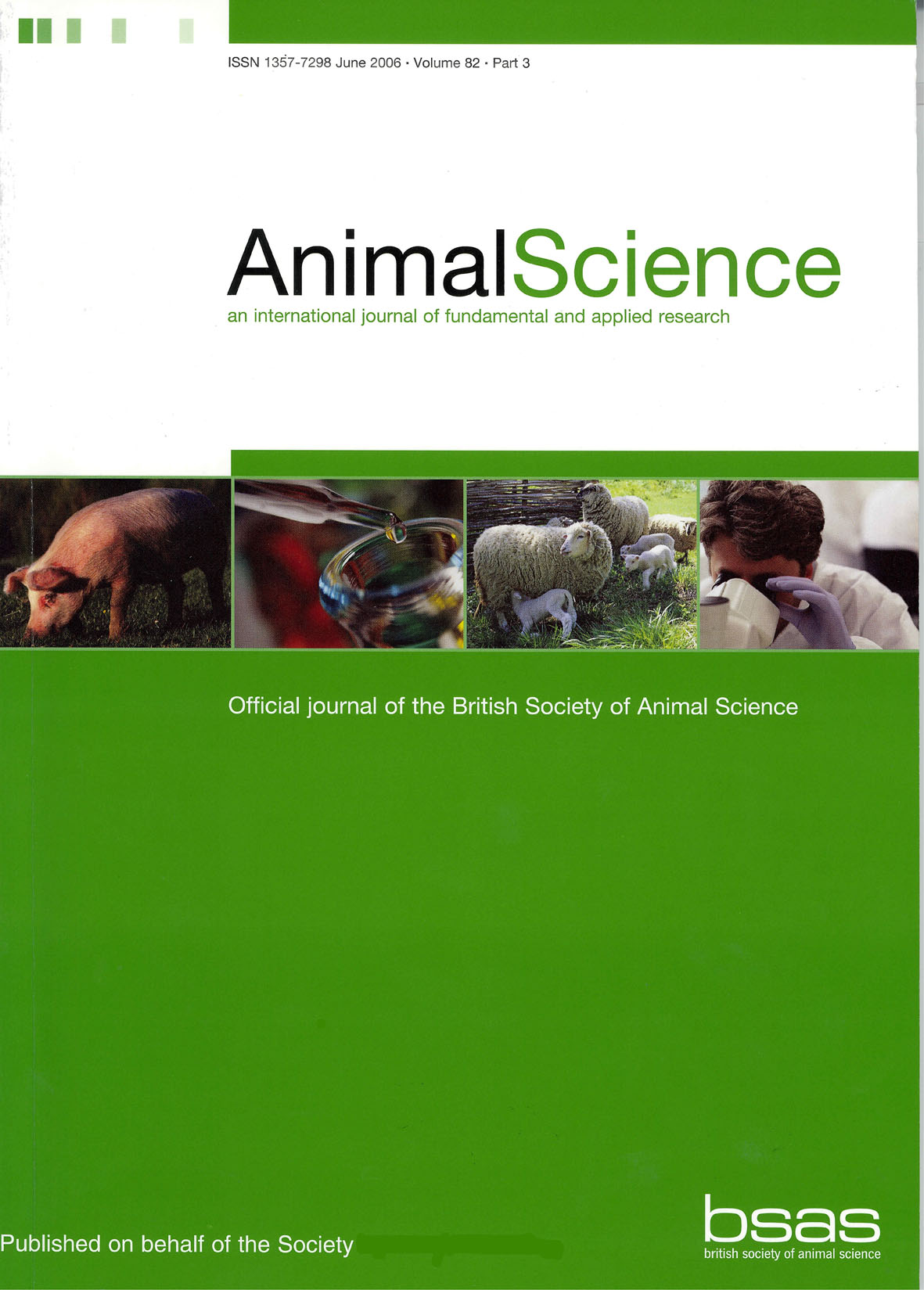Crossref Citations
This article has been cited by the following publications. This list is generated based on data provided by
Crossref.
Morgan, C. A.
Lawrence, A. B.
and
Garth, B.
2002.
Performance of newly-weaned pigs when housed with a pig with experience of creep food.
Proceedings of the British Society of Animal Science,
Vol. 2002,
Issue. ,
p.
219.
Wattanakul, W.
Bulman, C.A.
Edge, H.L.
and
Edwards, S.A.
2005.
The effect of creep feed presentation method on feeding behaviour, intake and performance of suckling piglets.
Applied Animal Behaviour Science,
Vol. 92,
Issue. 1-2,
p.
27.
Dybkjær, L.
Jacobsen, A. P.
Tøgersen, F. A.
and
Poulsen, H. D.
2006.
Eating and drinking activity of newly weaned piglets: Effects of individual characteristics, social mixing, and addition of extra zinc to the feed1.
Journal of Animal Science,
Vol. 84,
Issue. 3,
p.
702.
Torrey, Stephanie
and
Widowski, Tina M.
2006.
A note on piglets’ preferences for drinker types at two weaning ages.
Applied Animal Behaviour Science,
Vol. 100,
Issue. 3-4,
p.
333.
Wechsler, Beat
and
Lea, Stephen E.G.
2007.
Adaptation by learning: Its significance for farm animal husbandry.
Applied Animal Behaviour Science,
Vol. 108,
Issue. 3-4,
p.
197.
Weary, Daniel M.
Jasper, Jennifer
and
Hötzel, Maria J.
2008.
Understanding weaning distress.
Applied Animal Behaviour Science,
Vol. 110,
Issue. 1-2,
p.
24.
Held, Suzanne
Cooper, Jonathan J.
and
Mendl, Michael T.
2009.
The Welfare of Pigs.
Vol. 7,
Issue. ,
p.
47.
Tucker, A. L.
Duncan, I. J. H.
Millman, S. T.
Friendship, R. M.
and
Widowski, T. M.
2010.
The effect of dentition on feeding development in piglets and on their growth and behavior after weaning.
Journal of Animal Science,
Vol. 88,
Issue. 7,
p.
2277.
Kuller, Wikke I.
Soede, Nicoline M.
Bolhuis, J. Elizabeth
van Beers-Schreurs, Hetty M.G.
Kemp, Bas
Verheijden, Jos H.M.
and
Taverne, Marcel A.M.
2010.
Intermittent suckling affects feeder visiting behaviour in litters with low feed intake.
Livestock Science,
Vol. 127,
Issue. 2-3,
p.
137.
Reynolds, F.H.
Forbes, J.M.
and
Miller, H.M.
2010.
Does the newly weaned piglet select a zinc oxide supplemented feed, when given the choice?.
Animal,
Vol. 4,
Issue. 8,
p.
1359.
Hötzel, M.J.
Machado Filho, L.C.P.
Irgang, R.
and
Alexandre Filho, L.
2010.
Short-term behavioural effects of weaning age in outdoor-reared piglets.
Animal,
Vol. 4,
Issue. 1,
p.
102.
Oostindjer, Marije
Bolhuis, J. Elizabeth
Mendl, Mike
Held, Suzanne
van den Brand, Henry
and
Kemp, Bas
2011.
Learning how to eat like a pig: effectiveness of mechanisms for vertical social learning in piglets.
Animal Behaviour,
Vol. 82,
Issue. 3,
p.
503.
Figueroa, Jaime
Solà-Oriol, David
Manteca, Xavier
and
Pérez, José Francisco
2013.
Social learning of feeding behaviour in pigs: Effects of neophobia and familiarity with the demonstrator conspecific.
Applied Animal Behaviour Science,
Vol. 148,
Issue. 1-2,
p.
120.
Oostindjer, Marije
Kemp, Bas
van den Brand, Henry
and
Bolhuis, J. Elizabeth
2014.
Facilitating ‘learning from mom how to eat like a pig’ to improve welfare of piglets around weaning.
Applied Animal Behaviour Science,
Vol. 160,
Issue. ,
p.
19.
van Nieuwamerongen, S.E.
Bolhuis, J.E.
van der Peet-Schwering, C.M.C.
and
Soede, N.M.
2014.
A review of sow and piglet behaviour and performance in group housing systems for lactating sows.
Animal,
Vol. 8,
Issue. 3,
p.
448.
van Nieuwamerongen, S. E.
Soede, N. M.
van der Peet-Schwering, C. M. C.
Kemp, B.
and
Bolhuis, J. E.
2015.
Development of piglets raised in a new multi-litter housing system vs. conventional single-litter housing until 9 weeks of age1.
Journal of Animal Science,
Vol. 93,
Issue. 11,
p.
5442.
Rørvang, Maria Vilain
Ahrendt, Line Peerstrup
and
Christensen, Janne Winther
2015.
Horses fail to use social learning when solving spatial detour tasks.
Animal Cognition,
Vol. 18,
Issue. 4,
p.
847.
Turpin, Diana L.
Langendijk, Pieter
Plush, Kate
and
Pluske, John R.
2017.
Intermittent suckling with or without co-mingling of non-littermate piglets before weaning improves piglet performance in the immediate post-weaning period when compared with conventional weaning.
Journal of Animal Science and Biotechnology,
Vol. 8,
Issue. 1,
van Nieuwamerongen, S.E.
Bolhuis, J.E.
van der Peet-Schwering, C.M.C.
Kemp, B.
and
Soede, N.M.
2018.
Effects of pre-weaning housing in a multi-suckling system on performance and carbohydrate absorption of relatively light and heavy piglets around weaning.
animal,
Vol. 12,
Issue. 4,
p.
802.
Johnson, Anna K.
Colpoys, Jessica D.
Edwards‐Callaway, Lily N.
Calvo‐Lorenzo, Michelle
McGlone, John J.
Millman, Suzanne T.
Phillips, Christina E.
Ritter, Matthew J.
Sutherland, Mhairi A.
Tucker, Anita L.
and
Webb, Sherrie R.
2019.
Diseases of Swine.
p.
17.

